
The Lone Ranger is a fictional masked former Texas Ranger who fought outlaws in the American Old West with his Native American friend Tonto. The character has been called an enduring icon of American culture.
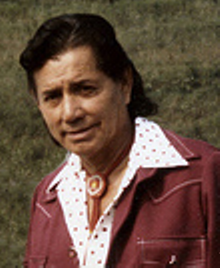
Jay Silverheels was an Indigenous Canadian actor and athlete. He was well known for his role as Tonto, the Native American companion of the Lone Ranger in the American Western television series The Lone Ranger.

Sherman Joseph Alexie Jr. is a Spokane-Coeur d'Alene-Native American novelist, short story writer, poet, screenwriter, and filmmaker. His writings draw on his experiences as an Indigenous American with ancestry from several tribes. He grew up on the Spokane Indian Reservation and now lives in Seattle, Washington.

The Coeur d'Alene Tribe are a Native American tribe and one of five federally recognized tribes in the state of Idaho.

Tonto is a fictional character; he is the Native American companion of the Lone Ranger, a popular American Western character created by George W. Trendle and Fran Striker. Tonto has appeared in radio and television series and other presentations of the characters' adventures righting wrongs in 19th-century western United States.

The Legend of the Lone Ranger is a 1981 American Western adventure film directed by William A. Fraker and starring Klinton Spilsbury, Michael Horse and Christopher Lloyd. It is based on the story of The Lone Ranger, a Western character created by George W. Trendle and Fran Striker.
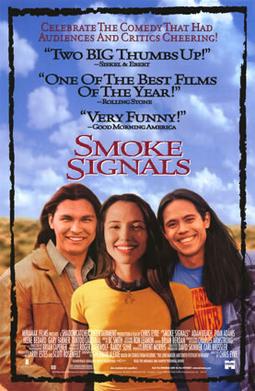
Smoke Signals is a 1998 coming-of-age comedy-drama film directed by Chris Eyre from a screenplay by Sherman Alexie, based on Alexie's short story collection The Lone Ranger and Tonto Fistfight in Heaven (1993). The film won several awards and accolades, and was well received at numerous film festivals.

James Phillip Welch Jr., who grew up within the Blackfeet and A'aninin cultures of his parents, was a Native American novelist and poet, considered a founding author of the Native American Renaissance. His novel Fools Crow (1986) received several national literary awards, and his debut novel Winter in the Blood (1974) was adapted as a film by the same name, released in 2013.

The Business of Fancydancing is a 2002 film written and directed by Sherman Alexie. It is loosely based on his 1992 book of the same name, a collection of stories and poems.

Winter in the Blood is the debut novel of James Welch. It was published by Harper and Row's Native American Publishing Program in 1974. Set on the Fort Belknap Indian Reservation in north-central Montana during the late 1960s, Winter in the Blood follows a nameless Blackfeet and Gros Ventre (A'aninin) man's episodic journey to piece together his fragmented identity. Welch received praise from such luminaries as Pulitzer Prize-winning Ojibwe author Louise Erdrich, celebrated American novelist Reynolds Price, and Coeur d'Alene author Sherman Alexie. Alexie later produced the film adaptation of the novel, which was released in 2012.

Victor Daniels, known professionally as Chief Thundercloud, was an American character actor in Westerns. He is noted for being the first actor to play the role of Tonto, the Lone Ranger's Native-American companion, on the screen.

Ten Little Indians is a 2004 short story collection by Sherman Alexie. The collection contains nine stories all of which focus on the Spokane tribe of Native Americans in Washington state.
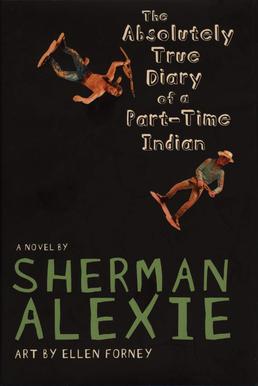
The Absolutely True Diary of a Part-Time Indian is a first-person narrative novel by Sherman Alexie, from the perspective of a Native American teenager, Arnold Spirit Jr., also known as "Junior," a 14-year-old promising cartoonist. The book is about Junior's life on the Spokane Indian Reservation and his decision to go to a nearly all-white public high school away from the reservation. The graphic novel includes 65 comic illustrations that help further the plot.

Reservation Blues is a 1995 novel by American writer Sherman Alexie, a member of the Spokane and Coeur d'Alene tribes.
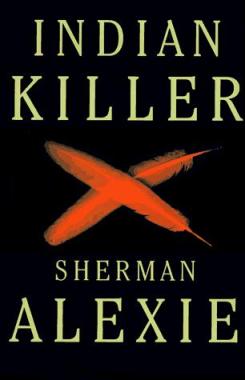
Indian Killer is a novel written by Sherman Alexie, featuring a serial killer in the city of Seattle, Washington, who scalps white men. Because of this technique, he is called the "Indian Killer" and rising fear provokes anti-Native American violence and racial hostility.
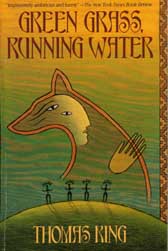
Green Grass, Running Water is a 1993 novel by Thomas King, a writer of Cherokee and Greek/German-American descent, and United States and Canadian dual citizenship. He was born and grew up in the United States, and has lived in Canada since 1980. The novel is set in a contemporary First Nations Blackfoot community in Alberta, Canada. It gained attention due to its unique use of structure, narrative, and the fusion of oral and written literary traditions. The novel is rife with humor and satire, particularly regarding Judeo-Christian beliefs as well as Western government and society. Green Grass, Running Water was a finalist for the 1993 Governor General's Award in Fiction.

The Lone Ranger is an American Western drama television series that aired on the ABC Television network from 1949 to 1957, with Clayton Moore in the starring role. Jay Silverheels, a member of the Mohawk Aboriginal people in Canada, played The Lone Ranger's Indian companion Tonto.
The Native Writers' Circle of the Americas (NWCA) is an organization of writers who identify as being Native American, First Nations, or of Native American ancestry.
Wellpinit is an unincorporated community in Stevens County, Washington, United States. Wellpinit has a post office with ZIP code 99040. It is the setting of the young adult novel, The Absolutely True Diary of a Part-Time Indian by Sherman Alexie. The population of the ZIP Code Tabulation Area for 99040 was 930 at the 2000 census.
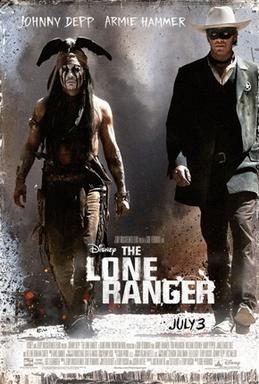
The Lone Ranger is a 2013 American Western action film directed by Gore Verbinski and written by Justin Haythe, Ted Elliott and Terry Rossio. Based on the title character of the same name, the film stars Johnny Depp as Tonto, the narrator of the events and Armie Hammer as John Reid, the Lone Ranger. The story tells through Tonto's memories of the duo's earliest efforts to subdue local villainy and bring justice to the American Old West. William Fichtner, Barry Pepper, Ruth Wilson, James Badge Dale, Tom Wilkinson, Helena Bonham Carter and Curtis Cregan are featured in supporting roles. This was the first theatrical film featuring the Lone Ranger and Tonto characters since William A. Fraker's 1981 film, The Legend of the Lone Ranger.
















